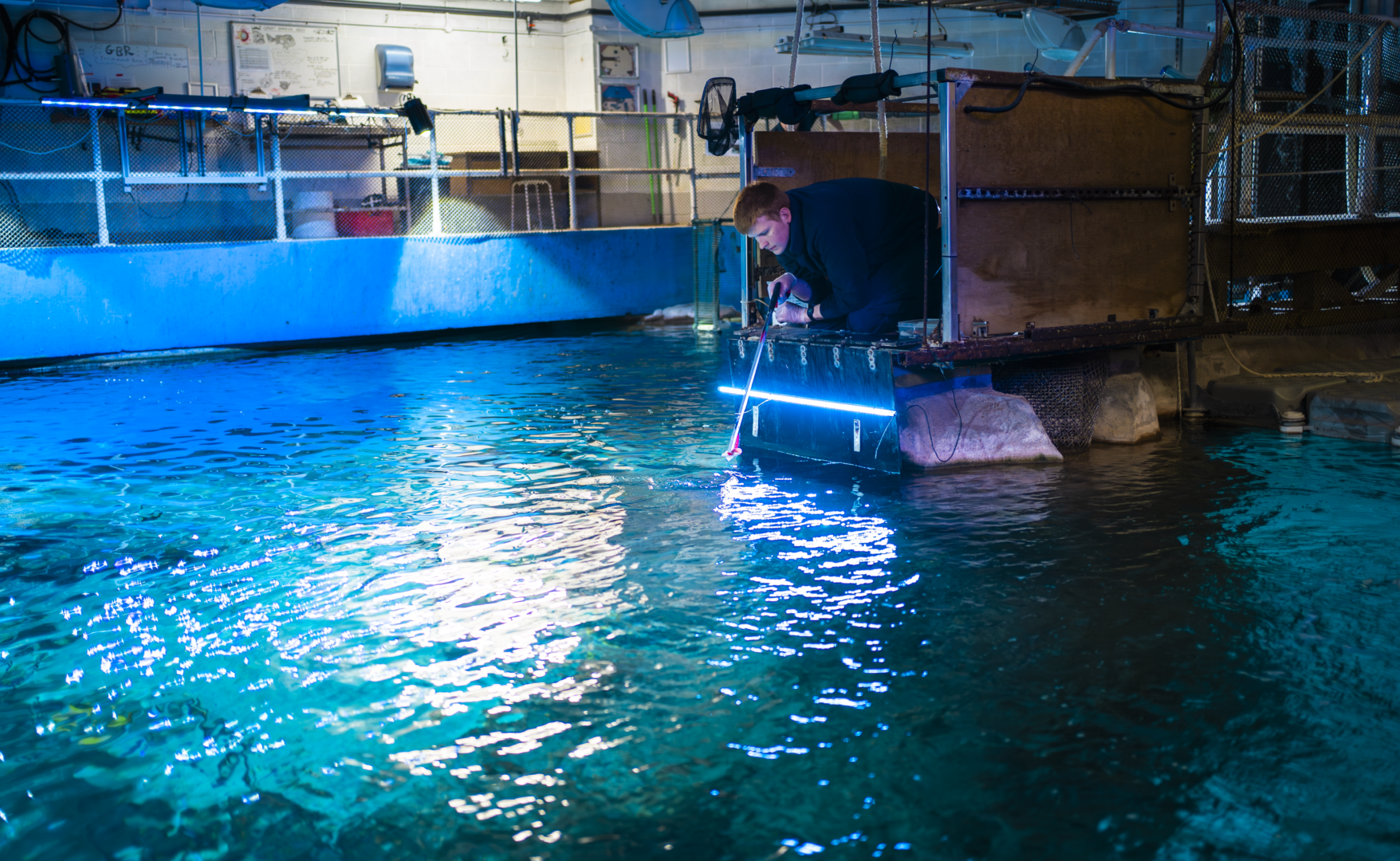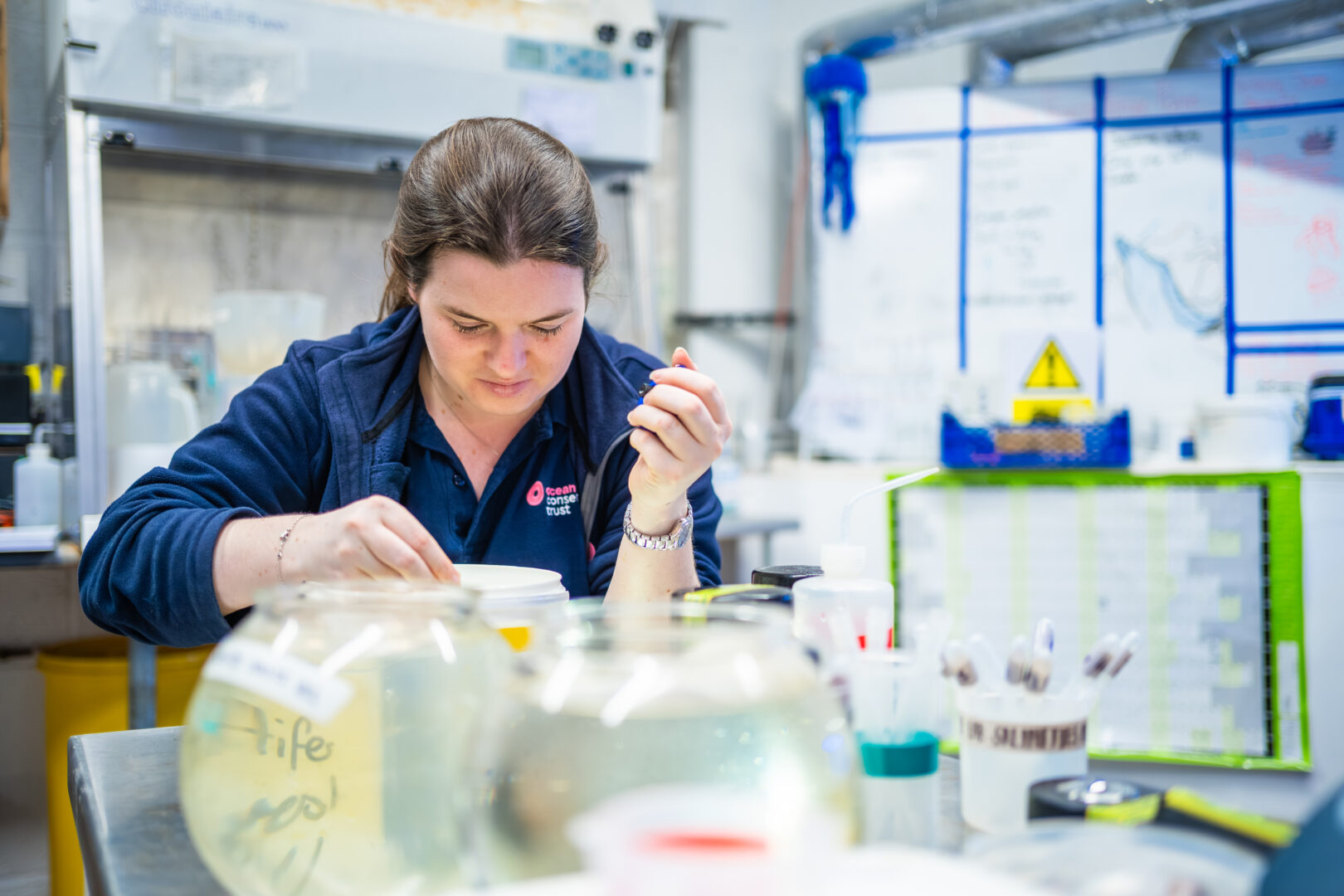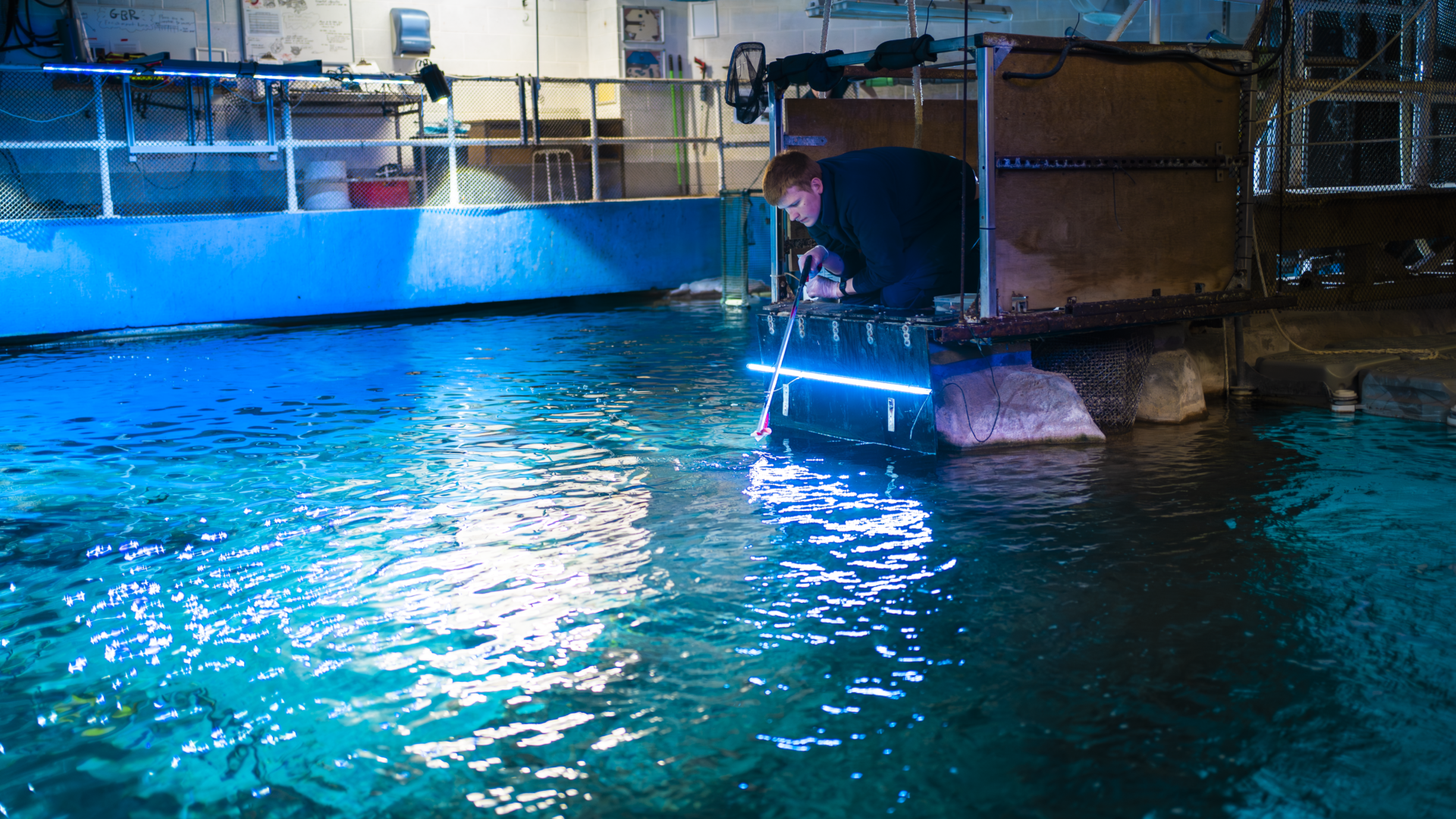So you want to become a Marine Biologist?

How to become a Marine Biologist
One of the regular questions we get asked is how to begin a career in Marine Conservation, so here is a quick guide on how to become a Marine Biologist.
So, you’ve decided you want to be a Marine Biologist…
That’s great! Being a marine biologist can be a very interesting and diverse career. It can however be very cold, wet and rather smelly at times! Marine biology researchers rarely end up swimming with dolphins or diving off the coasts of lovely warm countries for their career. The majority who find work will often spend time being cold, wet and seasick!
Tasks can include measuring dead fish on a fishing boat or diving in dark and murky water whilst looking for very small organisms. On many days you may not even be based outdoors. A lot of marine biologists might spend time in a laboratory, sitting at a bench or computer learning about the life cycle of a rare marine worm in places like Plymouth Marine Laboratories and the Marine Biological Association.
Science communicators in the field of marine biology are responsible for telling the public and school children about Ocean species and habitats, and all the latest research. Promoting conservation and encouraging Ocean friendly behaviour changes are important roles for many marine biologists.
Unfortunately, there are thousands of others who also want to become marine biologists. Competition is high and therefore you need to do your best throughout school, college and in some cases, university. Volunteering will help you stand out from the crowd, and show that, if you are able to, you are willing to spend your free time doing the thing you love best! Other ways to show your interest in marine biology out of school are creating your own marine biology blogs, podcasts, school clubs and more!
Most jobs that students go on to do are in universities, marine laboratories or in education. Many positions are also within the charity sector, so you should expect the pay to be quite low. However, it is a very rewarding path to take, so don’t give up and enjoy the journey!

What subjects would I need to study?
GCSEs
Start by working as hard as you can to get the best GCSE results possible. Some of the subjects you need are the Sciences (Biology, Chemistry and Physics), English and Maths. Other qualifications that would be helpful are I.T.C, Geography and Foreign languages.
Further Education/Mature Students
The best option is to look ahead at the university you would like to attend, and the entry requirements for that course. Many will require you to have one of the following:
- AS and A levels: Biology is the most important Science you need to take, with Chemistry being a close second. Maths, Geography, Computing or Psychology can also be useful subjects. Whatever you choose, at least two Sciences are recommended if you would like to go on to study Marine Biology.
If A Levels aren’t for you, or if you have not studied Science at school but are interested in a career change, a good starting point would be one of the following options:
- Access Course: City College Plymouth runs an Access to Higher Education course in Science, which is designed for mature students.
- BTEC/Applied Science: City College Plymouth also runs a BTEC Foundation Diploma in Applied Science, allowing students to gain UCAS points to put towards a university course.
University
You can go straight to university from school, but do not be afraid to take a gap year so that you can reflect on what career route you would like to take. If you are unsure whether Marine Biology is for you, you may want to consider doing another Science based course, such as Biological Sciences, Environmental Science or Ecology. This would enable you to think about your career route during the course, and to learn about fields of Marine Biology you might not have come across before. It will however still allow you to acquire skills which are completely transferable. This way, you would be able to focus more directly on Marine Biology in a Master’s course or research for a doctorate (Ph.D.). Whatever area of Marine Biology you want to enter after your time at university, a Science focused course is essential. Your school, college or local careers service should be able to help you find the right higher level institution for your needs. Always check the modules the University Course offers, as you can tailor some courses to subjects within biology that you are more interested in, for example marine or conservation!
During your undergraduate degree, you may want to consider attending some Marine Biological conferences. These provide great opportunities for networking, meeting current researchers and finding out more about different routes you can take. Volunteering alongside your studies in an establishment which specialises in Marine Biology is also an excellent way to make your CV stand out when you leave university.
What can you be doing now?
Start by exploring your passion in Marine Biology! This can be done in a number of ways:
- Getting involved in local beach cleans and rockpool rambles along the coast are a great way for you to acquire useful skills and knowledge. The National Marine Aquarium organises rockpooling sessions regularly at local beaches, as well as beach cleans throughout the year. The Devon Wildlife Trust also run rockpooling sessions, which take place at Wembury Marine Centre. If you are not local to Devon and Cornwall, you should be able to find some similar activities at your nearest coast, or in local nature reserves or parks. The Wildlife Trust is based all over the UK so check our the one closest to you!
- Join a local club for young people that runs Marine Biology themed activities, such as Ocean Squad run by the Aquarium. This week-long club gives you an insight into Marine Biology careers, and allows you to conduct experiments, explore our local shores through snorkelling and rockpooling and many more Ocean activities!
- You could also become a member of the Young Marine Biological Association who run events and offer support for young people looking at a career in Marine Biology. Learn more here.
- Volunteering is extremely useful for broadening your experience in this field. It not only shows you have a passion for Marine Biology but helps you to make contacts too. Many zoos and aquariums offer volunteering opportunities, including the National Marine Aquarium and Bristol Aquarium.
- Consider completing some work experience or an internship in an institute that specialises in Marine Biology, such as a laboratory or university. The National Marine Aquarium offers work experience opportunities in the Ocean Advocacy and Engagement team where you can learn all about science communication, and you can gain experience in husbandry through carrying out an internship.
- Snorkelling around the coasts of the UK is also a brilliant way to explore the ocean. It can be just as exciting as any coral reef! The National Marine Aquarium offers Snorkel Safaris for beginners during the summer months, but just heading to a rocky shore with an ID guide will help you learn loads about local species.
- Learn to dive! A popular first step to take is obtaining a PADI Open Water certificate. This is a great option if you would like to ‘test the water’ and decide whether diving is for you or not. You can even work your way up to achieve a PADI Dive Master certificate, which paid biologists often use to carry out their work around the world. Another route to take is to carry out HSE Professional Diving Training, which is offered by Plymouth University to those studying marine based courses. This allows you to gain the skills needed for commercial diving, and you can opt for Bronze, Silver, Gold or Platinum level. Just make sure you check the prerequisites first!
Here at the Aquarium our Marine Biologists come from a huge diversity of educational backgrounds including English Literature and Physiotherapy, proving that you can get into the field at any age! We also have many staff who have not been to university, and instead have acquired their skills through internships and apprenticeships so don’t feel pressured to go to university if you don’t think it’s for you – there is always another way!
We wish you lots of luck in your adventure into Marine Biology and hope to work with you in the future!

The National Marine Aquarium (NMA) is the UK’s National Aquarium, located in Britain’s Ocean City, Plymouth. We are proudly the home of the Ocean Conservation Trust, a charity dedicated to connecting people with the Ocean.
Find Out More











